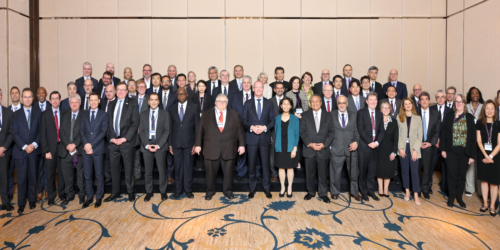Organisational Structure and Governance
The FSB is a member-driven organisation and decisions are taken by consensus. The FSB is governed by its Charter, Articles of Association and Procedural Guidelines.
The FSB discharges its accountability, beyond its members, through publication of reports and, in particular, through periodical reporting of progress in its work to the Heads of State and Governments and the Finance Ministers and Central Bank Governors of the G20.
The FSB is established as a not–for-profit association under Swiss law and is hosted by the BIS under a five-year renewable service agreement. The organisation structure of the FSB consists of the Plenary, Steering Committee, Standing Committees, Working Groups, Regional Consultative Groups, Chair and the Secretariat.
Details of our financial statements, governance structure and transparency and accountability-related activities can be found in our annual financial report.
Organisational chart of the FSB
Plenary

The Plenary is the sole decision-making body of the FSB. It consists of representatives of all Members and is currently composed of 59 representatives from 25 jurisdictions, six representatives from four international financial institutions and eight representatives from six international standard-setting, regulatory, supervisory and central bank bodies.
The Plenary:
- adopts reports, principles, standards, recommendations and guidance developed by the FSB;
- establishes Standing Committees and working groups
- decides on membership of the FSB, seat assignments to Members in the Plenary, composition of the Steering Committee and the Standing Committees;
- approves the work programme and the budget of the FSB, and appoints the Chair, Chairs of the Standing Committees, the Secretary General and the external auditor of the FSB.
Members of the FSB
The Chair
The Chair is the principal spokesperson for the FSB and represents the FSB externally. The Chair:
- is selected from representatives on the Plenary and appointed by the Plenary for a term of three years renewable once;
- convenes and chairs the meetings of the Plenary and of the Steering Committee, and oversees the FSB Secretariat; and
- may concurrently serve in a different role for a Member, for example as Central Bank governor, while serving as Chair of the FSB.
Steering Committee
The Steering Committee provides operational guidance between Plenary meetings to carry forward the directions of the FSB and prepare the Plenary meetings in order to allow the Plenary to efficiently fulfil its mandate.
The Steering Committee also has responsibility for:
- monitoring and guiding the progress of ongoing work;
- promoting coordination across the Standing Committees and working groups and commissioning work therefrom;
- ensuring effective information flow to the full membership; and
- coordinating and conducting reviews of the policy development work of the international standards setting bodies.
The Chair of the FSB is Chair of the Steering Committee
Members of the Steering Committee
Standing Committee on Assessment of Vulnerabilities (SCAV)
SCAV is the FSB’s mechanism for monitoring and assessing vulnerabilities in the global financial system and proposing to the Plenary the action needed to address them. SCAV has responsibility for:
- monitoring and assessing vulnerabilities affecting the global financial system and proposing to the Plenary actions needed to address them;
- monitoring and advising on market and systemic developments, and their implications for regulatory policy; and
- providing input for the Early Warning Exercise conducted in collaboration with the IMF.
Members of SCAV

Vacant
Chair of SCAV
Standing Committee on Supervisory and Regulatory Cooperation (SRC)
SRC has responsibility for:
- addressing key financial stability issues relating to the development of supervisory and regulatory policy, identifying relative priorities, and seeking to ensure that the different policy initiatives fit together into a coherent whole;
- assisting in managing the coordination issues that arise among supervisors and regulators on issues that have cross-sector implications and raise any need for policy development required to close regulatory gaps that pose risk to financial stability;
- setting guidelines for and overseeing the establishment and effective functioning of supervisory colleges; and
- advising on and monitoring best practice in meeting regulatory standards with a view to ensure consistency, cooperation and a level playing field across jurisdictions.
Members of SRC
Standing Committee on Standards Implementation (SCSI)
SCSI has responsibility for:
- ensuring comprehensive and rigorous implementation monitoring of international financial standards, agreed G20 and FSB commitments, recommendations and other initiatives in consultation and coordination with other relevant bodies, through mechanisms such as the Coordination Framework for Implementation Monitoring (CFIM);
- undertaking peer reviews amongst FSB members;
- reporting to the Plenary on members’ commitments and progress in implementing international financial standards, agreed G20 and FSB commitments, recommendations and other initiatives; and
- encouraging global adherence to prudential regulatory and supervisory standards, such as through the FSB’s Framework for Strengthening Adherence to International Standards
Members of SCSI
Standing Committee on Budget and Resources (SCBR)
SCBR has responsibility for:
- providing the Plenary with assessments of the resource needs of the FSB Secretariat taking into account the current mandate, the work programme and emerging demands;
- reviewing a medium-term budget and resource framework as well as annual resource budget for the FSB Secretariat, with due regard to cost control, for approval by the Plenary;
- identifying, evaluating and recommending to the Plenary options for independent raising of resources by the FSB, over the medium term, to supplement the funding received from the BIS; and
- ensuring, through appropriate arrangements, necessary transparency in the matters of financial governance of the FSB so as to be able to withstand public scrutiny.
Members of SCBR
The Secretariat
The FSB Secretariat is directed by the Secretary General and is located in Basel, Switzerland. The Secretariat is hosted by the Bank for International Settlements (BIS) and currently has 40 members including a Deputy to the Secretary General. A majority of the members on the Secretariat are on secondment from FSB member authorities. They:
- support policy development and the activities of the FSB; its Committees, Regional Consultative Groups and working groups;
- facilitate cooperation amongst members and between the FSB and other institutions;
- ensure efficient communication to members and others;
- maintain organisational records, administer the website and deal with the correspondence of the FSB; and
- manage efficiently the financial, material and human resources allocated to the FSB.






